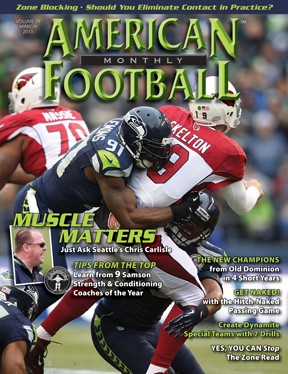Article CategoriesAFM Magazine
|
From the Coaches Bookshelf Ė Earn the Right To Win Ė By Tom Coughlin with David Fisher© More from this issue
I try to remember that, although sometimes it isnít easy for me. I do express my anger. At times it got out of control. I didnít just get angry, I erupted. On the sidelines, when an official made what I believed was a bad call, I let him know it, loudly. When a player made a mistake, I wasnít shy about telling him what I thought about it. As a member of my staff pointed out, it was ironic; I would drill it into my team over and over and over that they had to maintain control on the field no matter what happened, that they had to keep their poise, and that I did not want any penalties Ė while at the same time I was screaming, yelling, throwing clipboards, and losing control and my poise. One Sunday afternoon early in my career as a head coach, my wife was watching our game on television at home with my mother. After what I considered to be a bad call, the camera focused on me just as I let loose a long string of expletives. You didnít have to be an expert lip reader to know what I was saying. Judy was appalled. How was my mother going to react to seeing her son cursing on national TV? ďOh, donít worry about it,Ē my mother said. ďIíve heard that word many times before.Ē While many people wonít believe it, I actually have a good relationship with many NFL officials. At least some of the NFL officials. This is definitely a different type of communication. Usually, when Iím speaking to, or sometimes yelling at, officials, Iím trying to get their attention or make a specific point. Maybe Iíve disagreed with their call or Iím trying to get them to look at something. Iíve got only a few seconds before the next play to plead my case. In those situations the most important thing to remember is to keep the focus on the decision and to not make it personal. Keep it on a professional level. You have to be careful in these situations: You want people to listen to the point youíre making, not dismiss it because of the way youíre making it. If Iím trying to point out to an official that a defensive lineman is continually holding my player, I want him to look for that, not get angry at me for screaming at him. Iíve had officials ignore me because of the way Iíve made my point, not because it isnít right. Thatís human nature. Itís easy to write down this advice, but itís hard to remember in the moment. There is a tremendous amount of emotion surging through everybody on the field; thereís joy and anger, and thereís a lot of frustration, and it can change in an instant. My point is that we have to find ways to communicate with people whose goals and concerns are different from ours. One thing I do know for certain, though, is that shouting loudly is not particularly effective. Thereís no gain. Itís difficult to present a rational argument when youíre screaming. And in some instances screaming at the officials may have hurt my case. There are times when anger is an appropriate response. At times I still get angry on the sidelines. I guess I always will. Players want their coach to be fighting for them, especially when they believe a bad call has been made. Sometimes expressing that is the right thing to do. It ignites passion. You have to show that winning makes a huge difference to you and that youíre willing to fight for it. You have to show the people around you that you care enough to fight for them. Iíve never lost my passion for winning, so Iím never going to be able to completely contain my frustration on the sidelines. Iím never going to be calm and relaxed. The important thing is to maintain enough self-control to know when to express yourself and when to try to contain it. I have made an effort to tone it down at least a little bit, and Judy tells me that I do exercise at least a little more control. s |
|
| HOME |
MAGAZINE |
SUBSCRIBE | ONLINE COLUMNISTS | COACHING VIDEOS |
Copyright 2025, AmericanFootballMonthly.com
All Rights Reserved




